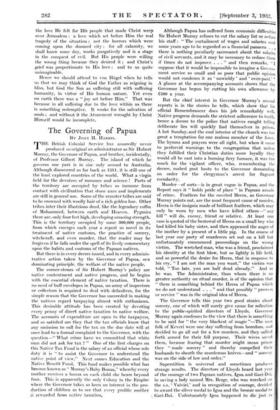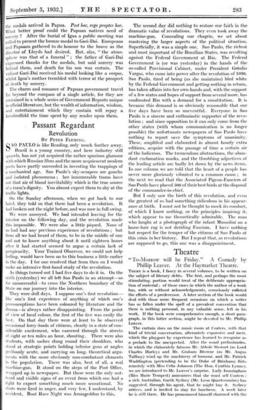The Governing of Papua
BY JOHN H. HARRIS. THE British Colonial Service has assuredly never produced so original an administrator as Sir Hubert Murray, the Governor of Papua, and brother, incidentally, of Professor Gilbert Murray. The island of which he governs one part is in size only second to Australia.
Although discovered as far back as 1511, it is still one of the least explored countries of the world. What a virgin field for the devotees of romance and science ! Parts of the territory are occupied by tribes so immune from contact with civilization that stone axes and implements are still in general use. Some of the remoter tribes are said to be crowned with woolly hair of a rich golden hue. Other tribes inter their illustrious dead, like the legendary coffin of Mohammed, between earth and Heaven. Pygmies there are, only four feet high, developing amazing strength. This is the territory occupied by some 300,000 people, from which emerges each year a report so novel in its treatment of native customs, the practice of sorcery, witchcraft, and even murder, that the reader may be forgiven if he falls under the spell of its lively commentary upon the habits and customs of the Papuan natives.
But there is in every decree issued, and in every adminis- trative action taken by the Governor of Papua, ore dominating principle, the welfare of the native people.
The corner-stones of Sir Hubert Murray's policy are native contentment and native progress, and he begins with the essential element of native taxation. There is no need of buff envelopes in Papua, no army of inspectors or collectors is required to deal with defaulters, for the simple reason that the Governor has succeeded in making the natives regard taxpaying almost with enthusiasm. This desirable attitude has been created by devoting every penny of direct native taxation to native welfare. The accounts of expenditure are open to the taxpayers, and so satisfied are they that the tax officials know that any omission to call for the tax on the due date will at once lead to a formal complaint to the Governor, with the question—" What crime have we committed that white man did not ask for tax ? " One of the first charges on this Native Tax Fund is the salary of an official whose sole duty it is " to assist the Governor to understand the native point of view," Next comes Education and the Native Benefit Fund, This fund makes possible what has become known as " Murray's Baby Bonus," whereby every mother receives a bonus on each child she bears beyond four. This is apparently the only Colony in the Empire Where the Governor takes so keen an interest in the pro- duction of children as to see that every prolific mother is rewarded from native taxation, Although Papua has suffered from economic difficulties Sir Hubert Murray refuses to cut the salary list or reduce his staff : " The curtailment of wages and salaries used some years agO to be regarded as a financial panacea . there is nothing peculiarly sacrosanct about the salaries of civil servants, and it may be necessary to reduce them if times do not improve • . . " and then remarks, " suppose that it would be impossible to imagine a Govern- ment service so small and so poor that public opinion would not condemn it as ' unwieldy ' and ' over-paid."' A -glance at the accompanying accounts shows that the Governor has begun by cutting his own allowance by £500 a year.
But the chief interest in Governor Murray's annual reports is in the stories he tells, which show that his official Remembrancer does his job remarkably well. Native progress demands the strictest adherence to truth, hence a decree to the police that natives caught telling deliberate lies will quickly find themselves in prison. A hot Sunday, and the cool interior of the church was too great a temptation for one zealous member of the force. The hymns and prayers were all right, but when it came to perfervid warnings to the congregation that unless they fulfilled their Christian duties more loyally they would all be cast into a burning fiery furnace, it was too much for the vigilant officer, who, remembering the decree, rushed post haste to the- Governor demanding an order for the clergyman's arrest for flagrant mendacity.
Murder—of sorts—is in great vogue in Papua, and the Report says it " holds pride of place " in Papuan annals of crime. Feathers for the coveted Heera, as Governor Murray points out, are the most frequent cause of murder. Heera is the insignia made of brilliant feathers, which may only be worn by men who have killed others—" any kill " will do, enemy, friend or relative. At least one case is quoted of.the bestowal of Heera on a small boy who had killed his baby sister, and then appeased the anger of the mother by a present of a little pig. In the course of last year one party of murderers set out on a kill but unfortunately commenced proceedings on the wrong victim. The wretched man, who was a friend, proclaimed his identity at the first blow, but so lightly is life held, and so powerful the desire for Heera, that in response to his cry, " I am not the man you want," the victim was told, " Too late, you are half dead already." And so he was. The Administrator, than whom there is no greater authority on ritual murder, is of the opinion that " there is something behind the Heera of Papua which we do not understand . . . " and that possibly " prowess or service " was in the original idea of Heera.
The Governor tells this year two good stories about sorcery, one of which will surely give cause for reflection to the public-spirited directors of Lloyds. Governor Murray again confesses to the view that there is something to be said for " the very blackest of magic "—The men folk of Keveri were one day-suffering from boredom, and decided to go all out for a few murders, and they sallied forth armed for their fell purpose. Their wives saved them, because fearing that murder might mean prison they " made sorcery " and thereby compelled their husbands to sheath the murderous knives—and " sorcery was on the side of law and order."
Superstition. is universal and sometimes produces strange results. The directors of Lloyds heard last year of the courage of two Papuan natives, Igua and Gari-Dai, in saving a lady named Mrs. Berge, who was wrecked on the s.s. Vaiviri,' and in recognition of courage, decided to award the silver medal .to Igua and the bronze medal to Gari-Dai. Unfortunately Igua happened to die just as the medals arrived in Papua. - Post hoc, ergo propter hoc. What better proof could the Papuan natives need of sorcery ? After the. burial of Igua a public meeting was called to present the bronze medal to Gari-Dai. Europeans and Papuans gathered to do honour to the brave as the director of Lloyds had desired. But, alas, " the atmo- sphere was that of a funeral " ; the father of Gari-Dai expressed thanks for the medals, but said sorcery was behind them, and death for his son was certain. The valiant Gari-Dai received his medal looking like a corpse, whilst Igua's mother trembled with terror at the prospect of death by sorcery.
The charm and romance of Papuan government travel far beyond the compass of a single article, for they are contained in -a-Whole series of Government-Reports unique in official literature, but the wealth of information, wisdom, and entertainment which they contain will repay .a hundredfold the time spent by any reader upon them.































 Previous page
Previous page